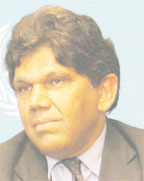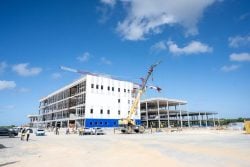Dr Bertrand Ramcharan, Ph.D. (LSE), Barrister-at-Law, is a former UN High Commissioner for Human Rights, Chancellor of the University of Guyana, Commissioner of the International Commission of Jurists, and Professor at the Geneva Graduate Institute of International and Development Studies. He is one of the founders of the newly established Guyana Institute of Public Policy, of which he is a Director. The Institute aims to generate thinking on issues that can help in the future cohesion and
development of Guyana.

By Dr Bertie Ramcharan
There is a national security issue of primordial importance, a national emergency, that demands a public policy debate in Guyana: the implications of the rising oceans. True, there has been discussion of flooding, its causes, consequences and cures; true, there are studies and programmes underway, nationally, regionally and internationally, to address the flooding issue. But the rising oceans call for a discussion of a fundamentally different nature. For the very future of the country and its people are at stake; and this discussion is overdue.
Guyana has historically been classified into three broad geographical regions. On the Atlantic coast of 270 miles there is a narrow belt of alluvial soil, most of which lies below high tide level and is protected by sea defences and canals. Nearly 90 percent of the population live and work here and the two main towns, Georgetown and New Amsterdam are situated in this belt. South of this there are the dense forests that cover almost four-fifths of the national territory. The forests continue southwards into the highland region of the interior. The third main geographical area is the savannah grassland, which lies behind the coastal belt in the northeast and beyond the forests in the southwest. (Source: UK Central Office of Information, February, 1966).
Guyana’s three main rivers, the Essequibo, the Demerara and the Berbice, enter the sea by way of wide estuaries. They are navigable by seagoing vessels for up to about 65 miles from the sea. A rising Atlantic Ocean could therefore penetrate, flood and overcome at least up to 65 miles of our great rivers. Should this happen, most of the coastal roads would disappear, most of the north-south roads would be immersed, the irrigation and drainage canals would be no more, the present-day alluvial soil would be degraded by salt-water, and the population would have to scramble for life on the higher grounds. Life, as we know it in Guyana, would be dramatically different.
No one can say for sure that this will happen or when; but no one can say that it would not – or that even now the ocean might not breach our walls or dams in and take over our lands. We need national security and development planning of a dramatically different kind in order to protect the security and welfare of our people – starting now.
Would we need to start planning for a new capital on higher ground? Would we need to identify agricultural lands that can eventually replace those presently in use? Would we need to identify fresh water sources that our people can draw upon? ‘Yes’, is the answer to all of these questions.
In the Maldives, where they think that rising oceans might put them under water, they are looking around for land to buy in other countries where they might resettle their population in case of need. The threat to our coastal area is no less than that of the Maldives. Fortunately, we have land on higher ground; but we need to start our planning process now as well.
To demonstrate how urgent this issue is, let us consider some of the evidence that has been around for some time. In November 2000, the Guyana Chronicle carried an article, ‘Scientists ponder effects of rising sea on Guyana coast.’ It reported on a seminar at the Institute of Applied Sciences at the University of Guyana where the following concerns were aired:
Since Guyana’s coastal strip is already some 2.4 metres below sea level, any marked rise in sea level could result in the coastal area, including Georgetown and New Amsterdam becoming seriously flooded.
The vulnerable areas included the coastal plain across the country, varying in width from about 15 kilometres in the North West to about 70 kilometres in the Corentyne.
One of the central questions raised at the seminar was: ‘Is Guyana losing the battle against the sea?’ A Guyana Sea Defence Review, completed by Dutch experts, had answered, ‘Yes, Guyana is losing its war against the sea.’ And Nero fiddled on!
If anything should have qualified as a national emergency, it was this!!!
In February, 2007, The World Bank published a Paper, “The Impact of Sea Level Rise on Developing Countries: A Comparative Analysis. The authors concluded that some countries would face severe loss of land. Suriname and Guyana would be very badly affected as most of their populations lived in low-lying areas.
Further evidence of an impending crisis came in March, 2007, from a study by the International Institute for Environment and Development in the UK, Columbia University and the City College of New York. The study listed Guyana among the countries with the most vulnerable populations, with a vulnerability rate of 55%.
On 13 October, 2007, Reuters carried a report, World Bank studies rising seas in Guyana. According to World Bank expert Gerald Meier, “sea levels around Guyana have arisen about 1.7 feet since the 1950s according to a tide gauge.” The same report said that the World Bank and the Global Environmental Facility had approved US$3.8 million in grant funding to protect low-lying coastal areas. The project was responding to the catastrophic flooding in Guyana in 2005, which had affected most of the coastal area. The project was meant to identify 10 key drainage systems and support construction work designed to increase drainage of the East Demerara Conservancy system by 35%. While commendable, this project was in effect tackling internal drainage systems, not the structural problem of a nation under assault from the sea.
Will Guyana go about its business blithely, ignoring threats to national security of the kind related in this essay? We sincerely hope not. Our aim in offering this essay has been to invite discussion of this pressing issue. We hope that Parliament, political parties, the Government, research institutions, and the public at large, will take part in a genuine national debate out of which might emerge policies and an action plan to save Guyanese from the relentless assault of the oceans.




